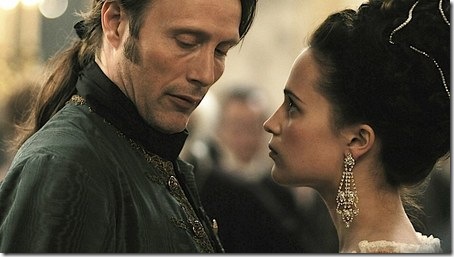Like Sofia Coppola’s Marie Antoinette, Nikolaj Arcel’s prestige drama A Royal Affair tells of a real-life arranged marriage between a foreign teenager and a narcissistic monarch, and for a while, it pulses with the same sense of feminist rage. Just as in Antoinette, the new Queen Caroline (Alicia Vikander) doesn’t love the king – that would be Christian VII, of Denmark (Mikkel Boe Folsgaard) – and the king doesn’t care much for her, either. He’s a boorish man who yells at the stage during plays, prances around with prostitutes and psychologically abuses his new queen.
She, meanwhile, is expected to provide an heir and little else. When she moves her dining room chair closer to the king during their first meal, he chastises her “flair for the dramatic.” Her favorite books from back home in Wales are banned in puritanical, backward Denmark, and she is told by a servant that “we’ll find other books for you to read.” When she screams in agony during the birth of prince Frederik, she is scorned, because “a true queen delivers in silence and dignity.”
If A Royal Affair continued on this road for its weighty length of 137 minutes, it would be an interesting, if familiar, revision of history from the point of view of an oppressed figure who lived in the footnotes of its textbooks. But, despite the occasional yield to the kind of grandiose, mawkish score favored by John Williams, A Royal Affair has much more on its mind.
Yes, there’s a forbidden romance, as its title suggests, between Caroline and Johann Friedrich Struensee (Mads Mikkelsen), a German proto-Doctors Without Borders type who leaves the romantic squalor of proletariat medicine to become the king’s personal physician. But in this movie, as in much of our lives, the personal is the political, and vice versa.
As the film presents it, the political system is broken in the 18th-century Danish monarchy. The king is a nihilist far removed from the literally unwashed masses – “Why does Copenhagen always reek of s—?” he exclaims, after an evening of drunken revelry – and he delegates governing responsibilities to the religiously dogmatic and bean-counting Council, rubber-stamping every law they present, including but not limited to: quashing the rights of peasants, promoting censorship and denying progressive reforms. Political lefties of today will see comparisons, not unfounded, to the evangelical conservatives of the Republican House.
It isn’t until Struensee, high on his clandestine affair with Christian’s wife, ingratiates himself into the society’s political infrastructure that Christian begins to subscribe to his doctor’s Enlightenment beliefs. Except that Struensee, who persuades the king to push through many progressive reforms, is not the “good guy” in this film. He’ll soon grow maniacal with power, as his life of increasing privilege corrupts his ideals, leading him to reinstate some of the country’s Dark Ages laws back into effect.
In A Royal Affair, all three characters in this love triangle are complex, never succumbing to archetypal black-and-white symbols, and all are subject to the tragic machinations of fate. This is a movie that takes its time and uses it well — to build character, understand the culture, probe the class divide and demonize no one, except the theocratic councilmen and judges. These callous bureaucrats are beyond repair, and unlike Lincoln, that great monument to congressional compromise, A Royal Affair suggests that the only possibility for genuine change is to uproot the entire political system. In the Danish cinema it may be the most appropriately cynical conclusion ever reached by a filmmaker not named Lars Von Trier.
A ROYAL AFFAIR. Director: Nikolaj Arcel; Cast: Mads Mikkelsen, Alicia Vikander, Mikkel Boe Folsgaard, David Dencik; Distributor: Magnolia; Rating: R; in Danish, German, French and English, with subtitles; Opens: Friday at Movies of Delray, Living Room Theaters at FAU, Lake Worth Playhouse, Mos’ Art Theatre, The Classic Gateway Theatre in Fort Lauderdale and more.
